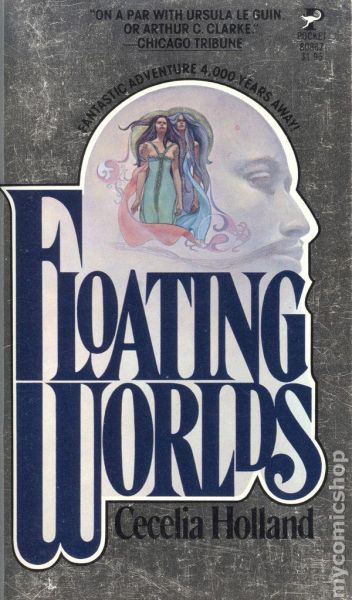A Little Bit Genghis Khan
Floating Worlds
By Cecelia Holland

11 Mar, 2018
Cecilia Holland’s 1976 Floating Worlds is a standalone SF novel.
Thousands of years in the future, Earth is a polluted wasteland where to venture outside unprotected is to commit suicide. This is a lamentable state of affairs but not one that the anarchists running Earth, for very loose values of running, seem interested in fixing … or able to fix. The Moon, Mars, Venus, the Asteroids, and the Outer Planets, however, are all home to thriving human communities. All of which seem to be managing their affairs, and their environments, more successfully than is Earth.
Paula Mendoza is a doctrinaire anarchist, the last person one would expect to get drawn into government work. She has a rare skill, however, one that is of unique value to Earth’s Committee for the Revolution. Paula is multilingual.
Imprisoned years ago in a Martian prison for refusing to submit to the indignity of export duties, Paula found herself in the company of three Styth, giant mutants from the floating cities of Uranus and Saturn. The Styth were imprisoned for the crime of having dark skin on a planet of virulent racists. Having nothing better to do with her time, she learned their language.
The inner worlds dismiss the Styth as freakish barbarians. Well, the Styth may be disorganized and violent, but their space ships are state-of-the-art and they have considerable experience when it comes to war. The Styth have built an impressive empire in the outer reaches of the Solar System. Now the wealth of the inner system has caught their eye.
Originally sent as an envoy, Paula buys Earth a decade of comparative peace. She copulates with the Akellar Saba and becomes pregnant. She chooses to accompany Saba back to the Empire. There she, like all other women, will be property. As she is not married to Saba, she will lack even the minor protection offered by wifely status. Legally, Saba could sell her or give her away as he pleased. Pragmatically, she has knowledge and skills that make her close to a person in Styth eyes.
Years pass and the Styth do not waste them. War with Mars ensues. Mars is over-confident; the Styth win. Next on the Styth menu: Earth. What are the odds that devastated, anarchic Earth can resist the Styth?
~oOo~
A planet run by anarchists seems unable to enact and enforce environmental protections, as one might expect. Still, the anarchists have maintained ideological purity. Isn’t that what matters?
Given the long SF tradition of stalwart anarchists triumphing over foul statists of all kinds, readers may have expected Paula and her fellow anarchists to pull off some cunning plan that would foil the Martian fascists and the equally repellent Styth. No such luck. Earth is on the losing side of history. It may be a footnote in the history books … if anyone reinvents the idea of history books after the Styth collapse back into warring nations.
Because me, while it is immediately obvious that this is not hard SF, I still want to talk about the setting. If you’re looking for a detailed examination of the Solar System after several millennia of settlement, look elsewhere. I will admit that floating cities on gas giants (with the exception of Jupiter) are not entirely implausible. Because they combine high mass with low density, all of the giant worlds save Jupiter have Earth-level gravities up in the clouds.
| Planet | Gravity (m/s/s) | Gravity (Planet’s/Earth’s) |
| Earth | 9.8 | 1.0 |
| Jupiter | 24.8 | 2.5 |
| Saturn | 10.4 | 1.1 |
| Uranus | 8.7 | 0.9 |
| Neptune | 11.1 | 1.1 |
While Neptune gets less light from the Sun than does Uranus, both planets have similar surface temperatures, thanks to geological activity. The Styth don’t seem to have settled Neptune, but their toolkit should be up to it. For that matter, their floating cities should work in Venus’ upper atmosphere. (But Venusians have opted for surface domes. I think.)
Holland has written an astounding number of historical novels. It’s not surprising that she has a historical model for the events in this novel, that model being the short-lived but incredibly destructive Mongol Empire, which managed — briefly — to conquer an area twice that of the Roman Empire at its greatest extent.

The cost of the Mongol conquest was incredible human misery and a measurable reduction in the human population.
As someone who is still angry about the Sack of Baghdad in 1258, I just don’t see the attraction of the Mongols as a model for SF novels. I have to admit that others do; in addition to Holland, Elizabeth Bear, Pamela Sargent, and Kate Elliot have all drawn on the Mongols for inspiration.
Still, one has to give Holland points for not prettying up the Styth. They are profoundly uninterested in anything that isn’t directly useful for their rolling sack of the Solar System. Styth men are racist, sexist slavers; they are so violent that pointless duels may be one of the main constraints on their population growth. Holland’s Solar System is not a nice place to live, but it is vividly portrayed and thus memorable for its unrelenting nastiness.
Perhaps not something to read if you are depressed. [Editor’s note: but the spare prose is elegant, as it always is in Holland’s work.]
Floating Worlds will be, I believe, an Early Bird Special on March 15.
Floating Worlds is available here (Amazon) and here (Chapters-Indigo).
